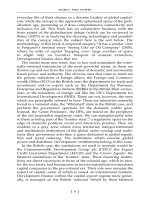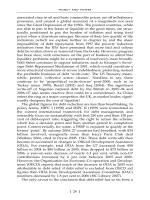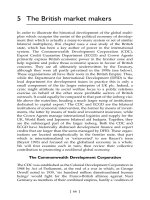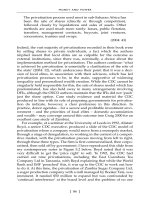Money and Power Great Predators in the Political Economy of Development_1 doc
Bạn đang xem bản rút gọn của tài liệu. Xem và tải ngay bản đầy đủ của tài liệu tại đây (491.9 KB, 20 trang )
MONEY AND POWER
Bracking_01_prelims.qxd 12/02/2009 10:56 Page i
Third World in Global Politics
Series Editor: Professor Ray Bush (University of Leeds)
The Third World in Global Politics series examines the character of politics
and economic transformation in the Global South. It does so by interro-
gating contemporary theory and practice of policy makers, planners and
academics. It offers a radical and innovative insight into theories of devel-
opment and country case study analysis. The series illustrates the
importance of analysing the character of economic and political interna-
tionalisation of capital and national strategies of capital accumulation in
the global South. It highlights the political, social and class forces that are
shaped by internationalisation of capital and which in turn help shape the
character of uneven and combined capitalist development in the South.
The series questions neoliberal theories of development and modernisa-
tion and, in highlighting the poverty of the mainstream, offers critical
insight into the theoretical perspectives that help explain global injustice
and the political and social forces that are available across the globe,
providing alternatives to economic and political orthodoxy of the
advocates of globalisation.
Also available
The End of Development: Modernity, Post-Modernity and Development
Trevor Parfitt
The Political Economy of Turkey
Zülküf Aydin
Poverty and Neoliberalism: Persistence and Reproduction in the Global South
Ray Bush
Bracking_01_prelims.qxd 12/02/2009 10:56 Page ii
Money and Power
Great Predators in the Political
Economy of Development
Sarah Bracking
Bracking_01_prelims.qxd 12/02/2009 10:56 Page iii
First published 2009 by Pluto Press
345 Archway Road, London N6 5AA and
175 Fifth Avenue, New York, NY 10010
Distributed in the United States of America exclusively by
Palgrave Macmillan, a division of St. Martin’s Press LLC,
175 Fifth Avenue, New York, NY 10010
www.plutobooks.com
Copyright © Sarah Bracking 2009
The right of Sarah Bracking to be identified as the author of this work has
been asserted by her in accordance with the Copyright, Designs and
Patents Act 1988.
British Library Cataloguing in Publication Data
A catalogue record for this book is available from the British Library
ISBN-13 978 0 7453 2012 0 (hardback)
ISBN-13 978 0 7453 2011 3 (paperback)
Library of Congress Cataloging in Publication Data applied for
This book is printed on paper suitable for recycling and made from
fully managed and sustained forest sources. Logging, pulping and
manufacturing processes are expected to conform to the environmental
standards of the country of origin. The paper may contain up to 70 per
cent post-consumer waste.
10 9 8 7 6 5 4 3 2 1
Designed and produced for Pluto Press by
Curran Publishing Services, Norwich, UK
Printed and bound in the European Union by
CPI Antony Rowe, Chippenham and Eastbourne, UK
Bracking_01_prelims.qxd 12/02/2009 10:56 Page iv
And for Pascal, Louie and Miles
Bracking_01_prelims.qxd 12/02/2009 10:56 Page v
Bracking_01_prelims.qxd 12/02/2009 10:56 Page vi
[ vii ]
Contents
Abbreviations ix
Preface xiii
1. The political economy of development 1
Institutions of the global economy 5
Frontier institutions 7
Why is money so important? 8
Institutions matter 9
Chapter plan 12
2. Money in the political economy of development 17
A short history of development finance 19
From debt crisis to system stability? 23
Debt relief and commercial write-downs 25
Aid: ‘much heat and light and signifying nothing’? 28
The current market for development finance 29
Conclusion 33
3. Making markets 35
Markets 35
Risk as governing technology 39
Political risk: uncertainty or calculable risk? 44
Sovereign political risk and market makers 45
The International Finance Corporation and
sovereign economies 48
Conclusion 51
4. International development banks and creditor states 53
Good banks or powerful owners? 56
The global Keynesian multiplier 61
Conclusion 63
5. The British market makers 66
The Commonwealth Development Corporation 66
The Export Credit Guarantee Department 79
Crown Agents 81
Neoliberalism and the frontier institutions 84
Conclusion 89
6. Poverty in Africa and the history of multilateral aid 92
Contemporary development research and poverty 95
Place, poverty and culture 96
Bracking_01_prelims.qxd 12/02/2009 10:56 Page vii
The theoretical contribution of multilateral
development assistance 99
A short history of multilateral development finance 103
Conclusion 109
7. Derivative business and aid-funded accumulation 111
Objectives for development finance 112
Patterns of multilateralism, domestic constituencies
and national shares 114
Derivative business at the Asian Development Bank 124
Derivative business at the African Development Bank 126
Crony networks and closed procurement 129
Conclusion 137
8. Private sector development and bilateral interventions 140
Benefits of private sector development instruments 140
Assisting accumulation – but development? 142
The European Development Finance Institutions 147
For the common affairs of the European bourgeoisie 149
Conclusion 156
9. Taking the long view of promoting capitalism 159
Post-colonial disinvestment 159
A review of the fairness of British economic relations overseas 163
Which institutions in Britain are owed debt? 164
Where did the debt come from? 169
Private sector development in action: the British case 171
Conclusion 178
10. Aid effectiveness: what are we measuring? 181
A big and largely inconclusive debate 181
Translating mainstream research 185
Representation of the poorest 188
A moral case 190
Conclusion 194
11. Conclusion 196
The current financial crisis 198
The problem of politics 202
A tale of two narratives 207
Where next for the political economy of development? 210
Bibliography 214
Index 233
CONTENTS
[ viii ]
Bracking_01_prelims.qxd 12/02/2009 10:56 Page viii
[ix][ix][ix][ix]
Abbreviations
ADB Asian Development Bank
ACP African, Caribbean and Pacific (countries)
AEF African Enterprise Fund
AFD Agence Française de Développement (formerly CCCE)
AfDB African Development Bank
AMSCO Africa Management Services Company
APDF Africa Project Development Facility
ARDA Agriculture and Rural Development Authority
(Zimbabwe)
ARV antiretroviral (drugs)
BERR Department for Business, Enterprise and Regulatory
Reform
BIS Bank of International Settlements
BWI Bretton Woods Institutions
CAFSL Crown Agents Financial Services Ltd
CCCE Caisse Centrale de Coopération Economique
CDC Commonwealth Development Corporation
CDG Commonwealth Development Group
CEO chief executive officer
CPRC Chronic Poverty Research Centre (Manchester, UK)
CSO Central Statistical Office (UK)
DAC Development Assistance Committee (OECD)
DEG German Finance Company for Investments in Developing
Countries
DfID Department for International Development (UK)
DFI(s) Development Finance Institution(s)
DGVIII Directorate General for Development, European
Commission
DTI Department of Trade and Industry (UK) (forerunner of
BERR)
EAP Engineers Against Poverty (UK)
EBRD European Bank for Reconstruction and Development
EC European Community
ECA(s) export credit agency/ies
ECGD Export Credit Guarantee Department (UK)
EDF European Development Fund
EDFI European Development Finance Institutions
EFP European Financing Partners
EIB European Investment Bank
EPSA Enhanced Private Sector Assistance (programme)
Bracking_01_prelims.qxd 12/02/2009 10:56 Page ix
ERP Economic Recovery Programme (Ghana)
ESAF Enhanced Structural Adjustment Facility (IMF)
ESAP Economic Structural Adjustment Programme
EU European Union
FATF Financial Action Task Force
FCIA Foreign Credit Insurance Association (US)
FCO Foreign and Commonwealth Office (UK)
FDI foreign direct investment
FMO Netherlands Development Finance Company
FSA Financial Services Authority (UK)
FSF Financial Stability Forum
GDA Global Development Alliance (US)
GDP gross domestic product
GFATM Global Fund to Fight AIDS, Tuberculosis and Malaria
GNI gross national income
GNP gross national product
GRD global resources dividend (Pogge’s concept)
HC House of Commons (UK)
HDI Human Development Index (UN)
HIPC Highly Indebted Poor Country Initiative
HIV/AIDS Human Immunodeficiency Virus/Acquired Immune
Deficiency Syndrome
HMSO Her Majesty’s Stationery Office (UK)
IADB Inter-American Development Bank
IBRD International Bank for Reconstruction and Development
ICE Institution of Civil Engineers (UK)
ICESCR International Covenant on Economic, Social and Cultural
Rights
ICMA International Capital Market Association
ICSID International Centre for the Settlement of Investment
Disputes (World Bank Group)
IDA International Development Association
IDC International Development Committee (UK)
IFC International Finance Corporation (World Bank Group)
IFI(s) international financial institution(s)
IFU Industrialiseringsfonden for Udviklingslandene (Danish
Industrialisation Fund)
IMF International Monetary Fund (World Bank Group)
ISI Import Substitution Industrialisation
KfW Kreditanstalt für Wiederaufbau
MDB Multinational Development Banks
MDGs Millennium Development Goals
MDRI Multilateral Debt Relief Initiative
MIGA Multilateral Investment Guarantee Authority
[x]
ABBREVIATIONS
Bracking_01_prelims.qxd 12/02/2009 10:56 Page x
MMC Monopolies and Mergers Commission (UK)
MNCs multinational corporations
MOU Memorandum of Understanding
MSCI Morgan Stanley Capital International (stock market
index)
NAO National Audit Office (UK)
NCM Nederlandsche Credietverzekering Maatschappij
NEPAD New Partnership for African Development
NGO non-governmental organisation
NIB Nordic Investment Bank
NIEO New International Economic Order
NIFA New International Financial Architecture
NPM New Public Management
NRI Natural Resources Institute (UK)
ODA Official Development Assistance
ODA Overseas Development Administration (UK forerunner
of DfID)
ODF Official Development Finance
ODI Overseas Development Institute (UK)
OECD Organisation for Economic Co-operation and Development
ONS Office for National Statistics (UK)
OOF other official flows
OPIC Overseas Private Investment Corporation (US)
PEFCO Private Export Funding Corporation (US)
PPP(s) public–private partnership(s)
PRS poverty reduction strategy
PRSP Poverty Reduction Strategy Paper
PSD private sector development
PVOs private voluntary organisations
RDBs regional development banks
ROSCs Reports on the Observance of Standards and Codes
SADC Southern Africa Development Community
SAP(s) structural adjustment programme(s)
SBI Société Belge d’Investissement International
SDCEA South Durban Community Environmental Alliance
SDRs special drawing rights (BWI unit of currency)
SIFIDA Société Internationale Financière pour les Investissements
et le Développement en Afrique
SILICs severely indebted low income countries
SMEs small- and medium-size enterprises
TINA ‘there is no alternative’
TSO The Stationery Office (the privatised HMSO)
UA unit of account (currency unit in AfDB)
UK United Kingdom
ABBREVIATIONS
[xi]
Bracking_01_prelims.qxd 12/02/2009 10:56 Page xi
UN United Nations
UNAIDS Joint United National Programme on HIV/AIDS
UNCITRAL United Nations Commission on International Trade Law
UNCTAD United Nations Commission for Trade and Development
UNCTC United Nations Centre for Transnational Corporations
UNDP United Nations Development Programme
UNECA United Nations Economic Commission for Africa
UNESCO United Nations Educational, Scientific and Cultural
Organisation
UNFAO United Nations Food and Agriculture Organisation
UNHCR United Nations High Commissioner for Refugees
UNICEF United Nations Children’s Fund
UNIDO United Nations Industrial Development Organisation
US United States of America
USAID United States Agency for International Development
USD United States’ dollars
WAS World Aid Section (UK)
WB World Bank
WFDFI World Federation of Development Finance Institutions
WHO World Health Organization
WIPO World Intellectual Property Organization
WTO World Trade Organization
ABBREVIATIONS
[ xii ]
Bracking_01_prelims.qxd 12/02/2009 10:56 Page xii
Preface
This book has taken a long time to write. It was begun in the mid-1990s
and then picked up again intermittently until January 2008, when I
applied myself to it more properly. This should not detract from its
central thesis: it is, instead, a book that has been ‘well cooked’. The book
is timely because the unwieldy global development machine is moving
again to focus on growth and the private sector, just as it did in the early
1980s, as opposed to poverty reduction and national programming with
government ‘partnership’. A shift in the modus operandi of intervention,
or ‘modus interventionus’, is forming around direct aid transfers to private
sector development, and this book reviews these in a critical light, over
the medium to long term. These medium-term trends in the develop-
ment industry are normally sufficiently long for a collective myopia to
set in around the failures of performance last time around, but because
this book evaluates across two of these phases – roughly from the mid-
1980s to 2007 – the characteristics of aid to the private sector can be
recounted timeously, just as a new phase of similar activity comes to
operational capacity. This may allow readers to put the development
industry into the context of the global political economy of develop-
ment, or at least that is the book’s aim. In other words, despite all the
recent talk of poverty reduction, behind the scenes the whole industry
of profitable development in the private sector, promoting profitable capi-
talism, has been going on regardless, and is now getting a whole set of
new investments. This book is about this industry.
The argument here is that political economy processes that have
made poverty in the present have not done so in the absence of efforts
in the area of development ‘aid’ but in spite of it and alongside it, and
systemically with the support of development finance institutions
(DFIs). Bearing this in mind, the book examines the proposition that
the political economy of development and development finance builds
a process in which poverty is, in a counterintuitive sense, not reduced,
but embedded and (re)produced. In sum, the book takes what we are
used to seeing – aid as a benevolent act of charity – and (re)represents
it as a profitable industry fixed in its own political economy. The ‘Great
Predators’ in all of this are the DFIs, whose activities must be brought
under democratic popular control in order to eliminate hunger and
deprivation. Left unaccountable, as they are now, and they will help to
produce more poverty in the foreseeable future.
At first glance, the book might appear packed with noisy numbers and
statistics, but I hope, as a reader, that you will see the benefit of this – I
have picked those numbers which serve a purpose of illustration, and the
[ xiii ]
Bracking_01_prelims.qxd 12/02/2009 10:56 Page xiii
text still serves as narrative. I am also trying to arrest the problem found
in some similar works of there being few if any empirics, to use a techni-
cal term, so allowing stories to be told about development which serve the
interests of the story teller but have little correspondence to the experience
of the world’s poor. Development for many is a chance to create a world
in their own image, to use a superego to make for others the (sometimes
hellish) world they have made for themselves: development, in short, can
say as much about the rich’s view of themselves as it does about the
poor’s quality of life. Numbers are therefore urgently required to sweep
away the piles of nonsense that have built up around the unreal benevo-
lence that is the Cinderella tale of global development intervention, and
replace it with the materiality of a work in progress of global capitalist
expansion and consolidation. This is not to say that there is no room for
solidarity, charity and concern, far from it, rather that such activity must
be redirected and focused to cooperative, democratic and popular ends.
Many people have helped in the making of the book, although its
errors, foibles and eclecticism remain mine. I interviewed a number of
people who deserve thanks for their time and patience between 1991 and
1995 in the offices of development agencies in Harare and London as
part of my Doctoral research, and some of that formative data is referred
to here, although the names of the individuals have not been recorded
as originally agreed. Ray Bush then provided reminders and encourage-
ment, so that this data and its transcripts, and the early work on this
book, didn’t remain locked in my bottom drawer, perhaps forever. I
would also like to particularly thank Morris Szeftel who had the oner-
ous job of supervising the original work I did in this area – perhaps now
I can tell him that it is finally finished! – and Patrick Bond, Paul
Cammack, Lloyd Sachikonye and David Beetham. Thanks to Barry
Winter for supporting me, and all of my family and friends, particularly
my parents Christine and Colin for their unerring patience. Colleagues
and students also need a mention, since intellectual influence is never
entirely confined to written sources but is part of the daily inspiration of
teaching and learning. Sojin Lim, Mark Langan and Sithembiso Myeni
were directly involved in helping me with particular data, while Philip
Woodhouse and Tim Jacoby spurred me on to the writing. Other people
who helped me access particular statistics are named in notes.
Overall, I would like to dedicate the book to parents and carers
everywhere who must bear that most terrible of tragedy: not having
food to give to a hungry infant. We can do better – when the elephants
fight, the grass gets trampled – so we must take the power to control what
the elephants are doing!
Sarah Bracking
Manchester
September 2008
MONEY AND POWER
[ xiv ]
Bracking_01_prelims.qxd 12/02/2009 10:56 Page xiv
[1]
1 The political economy of
development
Every day tens of thousands of workers and ‘beneficiaries’ toil to make
development happen: to feed hungry children, to vaccinate against
disease, to build schools, roads and airports, to promote good gover-
nance and civic education, and to do a host of other activities on an
ever-increasing list. Development competes with the great religions of
our time, motivating and disciplining, providing moral leadership and
proving a clarion call against the neglect of the poor, diseased and inca-
pable. As a social project it carries all the great meanings of the modern
age, from the Enlightenment to now, of human progress and the civil-
ising mission of human intervention. After the eclipsing of the socialist
project in the early 1990s, it has also become a harbour and home for
radicals of all persuasions, and has provided activities for well-
meaning people more generally, who care about the welfare of others,
to work, volunteer or donate their money for the greater human good.
In short, the common view of development is of a ‘great collective
effort to fight poverty, raise standards of living and promote one or
other version of progress’ (Ferguson 1990: 9). In this view progress and
‘modernisation’ will be the result of all this human effort, because
‘“win-win” solutions are available to development problems and an
inclusive and globalising market economy contains no intrinsic
obstacles to a better life for all’ (Mosedale 2008: 21).
But an alternative view also exists, where the collective efforts of the
mass of development workers can be blighted by relations of power in
society. The privileged and wealthy, in short, may not want to give up
their position, or share global resources more equitably. This is partic-
ularly the case when it comes to those development interventions
which affect the economy directly. That is to say, even the wealthy may
support greater childhood vaccinations and pay a charitable contribu-
tion to see that happen, but will resist a large-scale rise in their taxes.
This confirms the gift as a palliative at most, within a global social and
economic system which constantly reproduces marginality and desti-
tution: just as one child is helped, another, or two or more, becomes
vulnerable. In this view continued poverty is produced by an imperi-
alistic relation between the centre of the global economy and the edges,
or periphery (Ferguson 1990: 13), and this imperialist relation is part
and parcel of capitalist development (Bernstein 2005: 118; reviewed in
Mosedale 2008: 21). This book is in the second tradition. It goes further
than is normal practice, however, in explaining the intimacy between
Bracking_02_cha01.qxd 12/02/2009 10:56 Page 1
the development industry and the promotion of capitalism, through
detailing the interventions made in the private sector.
In other words, it is not just that a virtuous development industry
exists which is blighted and confounded by immanent processes of
capitalism, thwarted by social forces beyond its control. This in itself is
a fairly radical position. It is also that interventions in the private sector
in particular have come to reproduce and mirror those of the capitalist
global economy. A development bank, in short, does very little that is
different in meaning than a generic private bank. And it has the
bonus of the charitable label. A development project, like the
Chad–Cameroon oil pipeline, looks similar to a private sector initia-
tive, and indeed in this case, takes venture capitalism to new
boundaries of the possible in negotiating with authoritarian gover-
nance structures in order to ‘get things done’. In other words,
development is intimately connected and implicated in capitalist
process and imperialist logic.
This book explains how the development industry and its institu-
tions such as development banks contribute to the governance and
regulation of global capitalism. This in turn affects prospects for polit-
ical and economic development in the South. It contends that mass
poverty is a consequence of the system of regulation that development
contributes to. After nearly 70 years of effort to ‘do development’ at an
intergovernmental level, Northern states still help capitalism prosper,
while simultaneously claiming to help the victims of the inequalities it
produces. And development has failed: there are ever more instances
of victimhood and blight. Now there is a subtle point to be made here,
to distinguish this book from the many other neoliberal economists
and neoconservatives who claim that development is a waste of time
because it never works. My purpose is to show why the efforts of so
many right-minded people are being wasted in a system that channels
them wrongly. At present, they can’t work hard enough to keep
cleaning up after capitalism, and one way of making their job easier is
to stop powerful states making more social and economic inequality in
the first instance. The cruel irony being, that development institutions
often have a particular place in activities in the private sector which
take away people’s assets and livelihoods, impoverish them, and then
stymie the people’s efforts, alongside development workers, to help
themselves recover. If this remark strikes you as particularly ‘off-
message’, or suggestive of an indefensible tendency to conspiracy
theory, you need only take a look at the evidence that has been
recorded, against the odds, from people displaced and abused by
development, such as the anguish of the people of the Lesotho High-
lands who were made destitute by a dam and hydroelectric complex
(at ‘Mountain Voices’ on the internet).
1
MONEY AND POWER
[2]
Bracking_02_cha01.qxd 12/02/2009 10:56 Page 2
Thus, contrary to most books on development you may read,
‘failure’ in development will not be assessed here by looking at the so-
called deficiencies and absences of various attributes – skills, money,
political will, capacity and so on – within the South. This is the bread
and butter, and misguided product, of development studies, and has
been critiqued before by authors in the post-development and radical
development traditions.
2
Instead, the book will examine bilateral and
multilateral political economy relations between states, in order to
illustrate the nonsense that is the claim of benevolence in the post-colo-
nial practice of international aid. To clarify, individual acts of charity in
terms of food or vaccinations may sometimes be worthy of the term
benevolent, but the overall system is not. Not least because the larger
picture is dominated by transfers of public funds to private companies,
not by bowls of food to children. Who has the ‘development dollar’,
and what they choose to do with it, profoundly matters to people’s
lives. Therefore, the focus of this book is on this larger, mean sibling of
the welfarist public face of aid. It is about the ‘Great Predators’ in
particular, a term used here to refer to the development finance institu-
tions (DFIs) of Europe, North America and elsewhere, who, under the
guise of assistance, act as a Trojan horse, transporting the world’s
biggest companies and local ‘Big Men’ into a dominant position in the
economies of poor countries. But why ‘Great Predators’?
The metaphor relates to a classic construction of capitalism
proposed by Braudel, which is contrary to the conventional view of
capitalism that sees it as synonymous to the market with the state posi-
tioned antithetically to both (Arrighi 1994: 10). Braudel, instead, and in
a way which turns the classical formulation on its head, saw capitalism
as absolutely dependent on state power and as antithetical to the
market. For Braudel capitalism is a three-tiered construction, the
bottom layer of which is material life, the ‘stratum of the non-economy,
the soil into which capitalism thrusts its roots’ (Braudel 1982: 229). The
second tier is the market economy, where a degree of automatic coor-
dination occurs which links supply, demand and price. Most
economics roots itself in explaining this level, but there is another,
higher level, ‘the zone of the anti-market, where the great predators
roam and the law of the jungle operates. This … is the real home of
capitalism’ (Braudel 1982: 229–30).
This zone is ‘on the top floor of the house of trade’ (Arrighi 1994:
25), a ‘shadowy zone’ where financiers operate, using a ‘sophisticated
art open to only a few initiates at most’ to decide where foreign
exchange should go (Braudel 1981: 24). Given that capitalism, for
Braudel, was absolutely dependent on state power, it is not an abuse of
his construction to examine the role of pseudo-public sector financiers
in particular, the DFIs, as a sub-group of his class of ‘great predators’.
THE POLITICAL ECONOMY OF DEVELOPMENT
[3]
Bracking_02_cha01.qxd 12/02/2009 10:56 Page 3
This book has done just that, cognizant that the DFIs work with, and
alongside, finance companies operating more fully in the ‘private
sector’.
The argument of this book is that regulation of markets through the
use of public liquidity is central to managing the aspirations of
Southern populations in a permanent austerity cycle, and that the
people that do this job largely work in DFIs. Others have argued that
poverty in the South, and in Africa in particular, is constructed by
people from the North, using institutional systems that have been built
historically to benefit the rich (Bush 2007; Bond 2006). For example,
Bush (2007) wrote a trenchant critique of existing processes of global
capital accumulation, and showed how poverty is constantly created
and remade daily by processes inherent to the system: privatisation,
trade liberalisation and market ‘reform’. Bond (2006), following in the
footsteps of Walter Rodney’s seminal treatise, How Europe Underdevel-
oped Africa (1972), systematically assessed the routes and systems
through which Africa is looted of her resources and wealth. He
provides empirical data and examples to illustrate the inequities of the
trading system, the persistence of unequal exchange, the myths
surrounding the benevolence of aid, phantom aid and the degree of
capital flight and brain drain afflicting Africa. This book focuses on the
institutions that actually move the money around and create the iniq-
uitous flows that Bond (2006) outlines and the poverty that Bush (2007)
examines.
The book examines the political economy of global capitalism as it
particularly affects the poorest, by examining the mystified institutions
of the global concessional financing system (see also Gélinas 2003) and
the narratives in political economy which explain what they do. It
examines obscure and peripheral parts of the Northern states where
large and significant amounts of ‘aid’ money are vested to be used and
circulated in Southern countries for the benefit of the North, although
this is rarely said in these terms. We also see how development institu-
tions contribute to regulating the global economy and managing social
order and aspiration. The book ends by comparing the political
economy of development, as described here, with two predominant
narratives concerning development in sub-Saharan Africa. These are,
first, the ‘crisis but salvation’ narrative found in neoclassical economics
and used by the Bretton Woods institutions (BWI) and mainstream
development economists, which argues that ‘underdeveloped’ coun-
tries are in a crisis of poverty that needs external intervention in order
to transport the poor to their salvation. Second, the ‘resistance but subor-
dination’ narrative of radical or heterodox alternatives used in the
dependency theory tradition and by social movements, in which
workers and peasants in the South nobly resist the encroachments of
MONEY AND POWER
[4]
Bracking_02_cha01.qxd 12/02/2009 10:56 Page 4
global capitalism but are nonetheless relatively powerless because they
are dependent on it.
In brief, we will see how the ‘crisis but salvation’ narrative, the first
of these, couples and conflates ‘development’ with capitalist growth
and then misrepresents political economy in sub-Saharan Africa while
serving the interests of powerful people well. Meanwhile, the second
narrative, ‘resistance but subordination’, reflects the radicalism of the
independence and nationalist period but in contemporary terms fails
to appreciate the critical role of African elites in negotiating with, and
participating in, the processes of power and ‘subjectification’
ensnaring modern African populations. In other words, Anglophone
Africa inherited adverse political economy structures which are main-
tained by contemporary development practice, with the participation
of African elites (see chapter 11). This book examines the empirical
bases for these narratives of the political economy of development
with reference to Africa primarily and focuses on the economies in
which the poorest, or the ‘Bottom Billion’ as Collier (2007) has recently
called them, live.
3
Institutions of the global economy
So, why has social development failed in large swathes of the South
(see Chronic Poverty Research Centre (CPRC) 2004; and chapter 6) and
how has the profitability of global market capitalism, represented in
ostentatious and incredible wealth accumulated by core institutions,
states and privileged individuals within them, been perpetuated in the
North? The first contention is that the two phenomena are critically
related (see Hickey and Bracking 2005; Green and Hulme 2005; Pogge
2001; Milanovic 2003), and not just by illustration or intuition but by
purposive action by institutions in support of particular structures of
markets, investment and trade. Power is made everyday by the small
and large actions and reactions of individuals, groups, communities
and institutions, going about their business within the inherited struc-
tures of class struggle. So what are the critical institutions representing
the power and interests of the rich?
First, it is important to indicate that the global economy is not an
even space of regular economic interactions but has lumpy nodes of
multiple exchanges and thin areas where less exchange takes place.
The powerful nation states are these lumpy nodes and from them
economic transactions spring out and reach for, generally, other crit-
ical nodes. Thus, the even coverage of colour of a densely sown
flowerbed might look like an even canvass but below the canopy
there remain only discrete stalks descending into the soil below.
Metaphorically, these stalks are the nation states, emerging from the
THE POLITICAL ECONOMY OF DEVELOPMENT
[5]
Bracking_02_cha01.qxd 12/02/2009 10:56 Page 5









